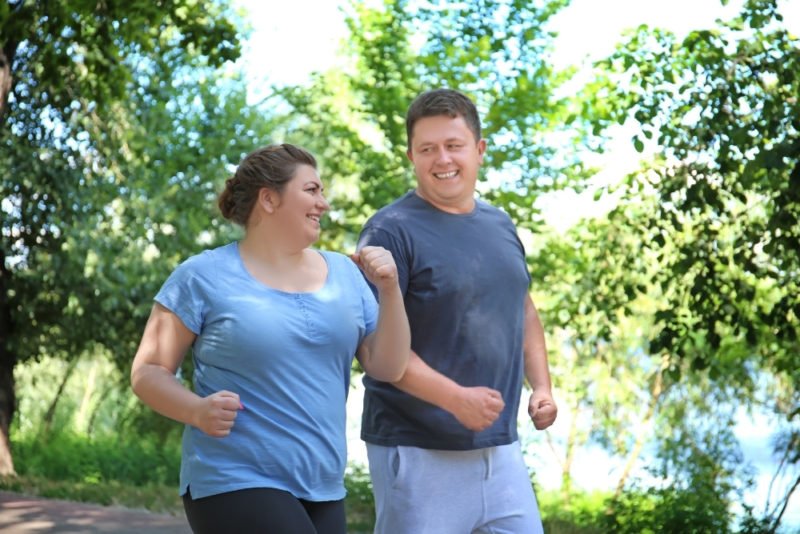
Like it or not, weight and health continue to be conflated in our society. But weight and health are not synonymous — it’s possible to be healthy or unhealthy in a thin body, and healthy or unhealthy in a fat body. An individual person’s health is determined by their genetics, their lifestyle and their environment (environment meaning everything from exposure to toxins to safe neighborhoods to access to healthcare and healthy food). Just as a thin person shouldn’t assume they will always be healthy simply because they are thin, a fat person shouldn’t assume they are doomed to be unhealthy unless they lose weight.
But many of the behaviors that can contribute to better health in people of all sizes slip to the back burner when weight loss isn’t on the agenda. I have literally heard (former) patients say things like, “I started exercising again but after six weeks I didn’t lose any weight so I stopped,” or “I’ve never really exercised or worried about what I ate because I didn’t have to” (this in a thin patient who was just diagnosed with pre-diabetes that was a whisper away from becoming full-fledged diabetes).
I think that most of us would like to be as healthy as possible for as long as possible, right? Again, health is individual, so one person doing the “right” things might never be as healthy as someone else doing the “right” things (again, genetics and environment play key roles). But we can all take care of what we’ve got, and do it in a way that supports mental health (i.e., not in an obsessive way). Here are the five key factors we have (reasonable) control over that impact our health.

1. Value nutrition for its own sake
It’s so easy to pay attention to nutrition when we want to change something about our bodies, especially our body size. But the value of nutritious food goes far beyond how it’s prioritized in diet culture. Our body uses carbs, protein and fat (the macronutrients) for essential bodily functions, and the same is true for micronutrients — vitamins and minerals. I would throw phytochemicals in there, too, because many of them have antioxidant properties. Bones, muscles, brain function, healthy arteries, eye health — nutrients support all of these things, and that’s only scratching the surface. Calories, specifically calories from carbs, give us energy, but the rest helps us perform and feel our best in other ways.
I could write a whole book on nutrition (ha!), but the simplest advice I have is to:
- Eat the best quality food you can afford and have access to.
- Include a variety of foods generally (i.e., over the span of a week, a month, a season, a year…you don’t have to cram in every type of nutritious food in one meal or one day).
- Include some vegetables at at least two meals a day (please).
- Pay attention to how your food makes you feel, and adjust accordingly.
Two more things to keep in mind:
- Health is so multifaceted that it would be impossible for any one food, one supplement or one diet to have an impact that even resembles magical status. Small steps, taken consistently and turned into healthy habits, are what make a difference. Not dramatic, and certainly not sexy — but true.
- If the way you eat makes you unhappy, it’s not the right way for you. This “unhappiness” cuts a few ways. For example, if following the “healthiest” diet in the world makes it impossible to socialize with friends over food because there’s nothing you “can eat,” and requires you to cook everything from scratch even though it stresses you out, then that’s not the right diet for you. Conversely, if the way you eat leaves you perpetually hungry, tired and cranky, or perhaps overfull, lethargic and uncomfortable, those are clues that something needs to change. Feeling like you would kill for a cracker or might fall into a food coma promotes neither health nor happiness.
Not surprisingly, Intuitive Eating provides a wonderful framework for all of this.

2. Move your body often
While there is abundant evidence for the benefits of nutritious food for health and well-being, the evidence is even stronger for regular physical activity. That’s true for all people, of all ages, of all sizes. But the unfortunate fact remains that many people who aim to improve their eating and exercise habits view it as a means to an end: a lower number on the scale and a smaller size on the clothing rack. It’s time to decouple exercise from weight loss.
Regular physical activity significantly reduces the risk of heart disease, specifically the types of exercise that improve cardiorespiratory fitness, or what you might think of as endurance. If you start a new walking route that includes hills, and you find yourself out of breath, but the more you walk that route the less out of breath you feel, that’s a sign that you’ve improved your cardiorespiratory fitness.
The Physical Activity Guidelines for Americans recommend getting 150 to 300 minutes (2.5 to 5 hours) per week of moderate-intensity physical activity, such as brisk walking, or 75 to 150 minutes of vigorous activity, such as running. If that sounds daunting because your activity levels are currently low, take heart: The benefits of physical activity start building at lower levels of activity — as little as an hour per week of moderate activity — and any exercise is better than none.
The guidelines also recommend doing muscle-strengthening activities—such as lifting weights, using weight machines or resistance bands, or doing body-weight exercises like squats, lunges and pushups—that involve all major muscle groups at least twice a week. This is important for adults of all ages, but it is especially important past the age of 35 or so, because that’s the point where your body’s default shifts from building/maintaining muscle to breaking down muscle. Preventing muscle loss is key not just for staying physically independent as we age, but it improves health in many other ways.
Even better, exercise has been shown to expand our brain volume and strengthen our neural networks — including those that are associated with habit formation. This may be why many people find it easier to eat healthfully when they’re exercising regularly. The brain changes that happen when we form one healthy habit may “transfer” to another habit. Dismissing exercise because it doesn’t change your body size means you’ll miss out not only on its inherent health benefits, but you’ll miss the benefits of its positive spillover into other areas of your life. So find some types of activity you enjoy, or are curious to try, and then pay attention for how you feel physically and mentally when you are doing these activities regularly, compared to how you feel when you are being less active.

3. Don’t treat sleep as an afterthought
Do you chronically go to bed late because you feel like the hours between 9 p.m. and midnight are your only “me time,” even if you feel better with a full night’s sleep? These kinds of warring impulses are common, but here’s something that might tip the scales in the favor of sleep: postponing bedtime — especially when you have a firm morning wake-up time — creates a sleep deficit that may increase your risk of future health problems, including heart disease and type 2 diabetes.
No matter how well you eat and how regularly you exercise, chronically skimping on sleep will hurt you. Research has shown that lack of sleep interferes with our hormone cycles — including the hormones that regulate appetite and stress. One week of mild sleep restriction increases levels of inflammation in the body and impairs brain function, especially the parts related to learning and memory. Weekend catch-up sleep helps — but not with the brain-function part, and some research suggests those impairments may add up over time. Plus, daytime sleepiness makes it harder to commit to regular exercise or make nutritious food choices, causing additional hits to your health.
If you tend to see going to bed on time as a chore or just one more thing on your “to-do” list, try viewing it in a different light. Perhaps as a luxurious form of self-care?

4. Inventory your coping “toolbox”
When everything hits the fan, what tools do you have handy? Occasionally using food to relax or lift your spirits is probably no big deal, but leaning heavily on food for comfort is counterproductive. Why? Because emotions are information, and when we numb out or distract ourselves with food, we aren’t really listening to that information, which can prevent us from meeting an underlying emotional or physical need.
Being aware of when you are eating to self-soothe is a first step to breaking unhelpful eating patterns—if you don’t know you’re doing it, you can’t change it—but curiosity is also key. The next time you feel upset, try to identify exactly what you are feeling. Sadness? Anger? Disappointment? Rejection? That’s information you can use to start finding real solutions.
While developing a go-to list of things that can help you cope with stress and strong emotions—phoning a friend, going for a walk, listening to favorite music, and so on is extremely useful, here’s one tool you might not have thought of: self-compassion.
Research shows that people who have higher levels of self-compassion tend to handle stress better — they have less of a physical stress response when they are stuck in traffic, have an argument with their spouse or don’t get that job offer — and they spend less time reactivating stressful events by dwelling on them. That’s important, because not only does chronic stress directly harm health — the physical responses to stress include spikes in blood pressure and blood sugar, along with suppression of the immune system — but if you also react strongly to that stress, you’re more likely to use unhealthy short-term coping mechanisms such as smoking or numbing your feelings with food or alcohol.
Self-compassionate people are also more likely to adopt health-promoting behaviors and maintain them even if they don’t appear to be paying off in the short term. This may be especially important in the face of a health-related setback, such as injury, illness or a disappointing lab result, because self-compassion takes the edge off negative emotions — fear, frustration and disappointment — that might arise. This helps you continue to take good care of yourself instead of getting derailed.

5. Don’t defer preventive healthcare
Mammograms don’t prevent breast cancer, glucose screening tests don’t prevent high blood sugar and slapping on a blood pressure cuff doesn’t prevent hypertension — but preventive healthcare is still vitally important.
Officially, there are three levels of preventive health: primary, secondary and tertiary. Primary prevention is when you are healthy and want to stay that way. Your blood sugar, blood pressure and cholesterol are in the normal range, and you cultivate habits that will help keep them there. For example, eating nutritious food, staying physically active and managing stress.
Secondary prevention is where screening tests and exams come in. They help you catch problems early when they are generally easier to treat. They may even be treatable with healthy lifestyle changes alone. It’s better to learn you have high blood sugar when it’s still classified as “pre-diabetes.” It’s better to detect cancer cells before they can multiply and spread. Tertiary prevention is what happens next if your doctor tells you something you don’t want to hear. You have diabetes. You have hypertension. That chest pain you felt was a heart attack. At this point, you’re trying to treat an established health problem and prevent serious complications.
One of the very real concerns about the coronavirus pandemic is that many people are skipping preventive healthcare—not hard to do, because people rarely enjoy having their blood drawn, getting a colonoscopy, having your breasts squished between glass plates, and so on. And other people, especially women, may skip preventive care—especially breast, skin and cervical cancer screenings—if they are ashamed of their bodies or have gained weight since their last doctor’s visit. But there’s a reason for the saying, “An ounce of prevention is worth a pound of cure,” so please, please don’t push these exams, screenings and tests to the back burner!
Disclaimer: All information provided here is of a general nature and is furnished only for educational purposes. This information is not to be taken as medical or other health advice pertaining to an individual’s specific health or medical condition. You agree that the use of this information is at your own risk.
Hi, I’m Carrie Dennett, MPH, RDN, a weight-inclusive registered dietitian, nutrition therapist and body image counselor. I offer compassionate, individualized care for adults of all ages, shapes, sizes and genders who want to break free from eating disorders, disordered eating or chronic dieting. If you need to learn how to manage IBS symptoms with food, or improve your nutrition and lifestyle habits to help manage a current health concern or simply support your overall health and well-being, I help people with that, too.
Need 1-on-1 help for your nutrition, eating, or body image concerns? Schedule a free 20-minute Discovery Call to talk about how I can help you and explore if we’re a good fit! I’m in-network with Regence BCBS, FirstChoice Health and Providence Health Plan, and can bill Blue Cross and/or Blue Shield insurances in many states. If I don’t take your insurance, I can help you seek reimbursement on your own. To learn more, explore my insurance and services areas page.






